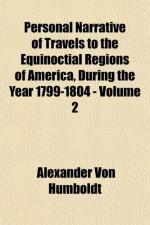|
This section contains 1,789 words (approx. 6 pages at 300 words per page) |

|
Overview
Alexander von Humboldt (1769-1859), a German geologist and naturalist, and Aimé Bonpland (1773-1858), a French botanist, engaged in a new sort of scientific travel involving systematic measurement and observation of a remarkable range of organic and physical phenomena with dozens of sophisticated scientific instruments. Humboldt's ultimate goal for these researches was to understand nature as an interconnected whole. Humboldt and Bonpland inspired a generation of scientific explorers and established new methodologies and new instrumentation standards.
Background
The eighteenth-century expeditions of Charles Marie de La Condamine (1701-1774), Louis Antoine de Bougainville (1729-1811), and Captain James Cook (1728-1779) provided the model of scientific exploration followed by Humboldt and Bonpland. In all of these earlier instances scientific travelers bravely explored mysterious lands...
|
This section contains 1,789 words (approx. 6 pages at 300 words per page) |

|


